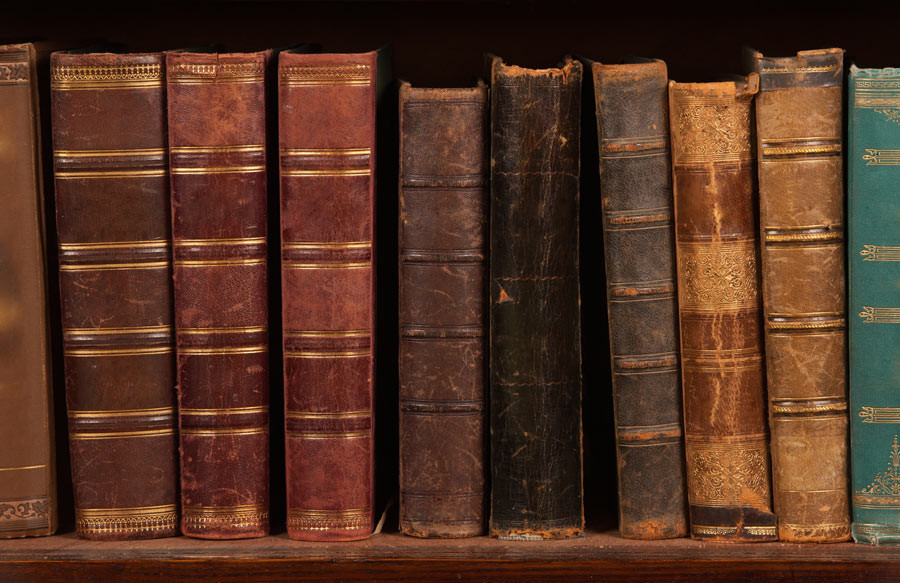
Check out our Journal Roundups for the latest articles in Islamic studies. Fifty-five iterations have been published and the Winter 2020 edition is now online. The Winter 2020 edition currently has issues from forty-four journals in a wide variety of subjects and disciplines and will be revised as more journals announce their Winter issues.
The journal roundup project covers over ninety English language journals in a variety of disciplines related to Islamic Studies, providing the table of contents for each journal as a tool for researchers, academics, students, and those generally interested in the field of Islamic Studies. We include only articles; book reviews can be found on the journal sites. Please let us know if we have missed any journals or if you have questions at journals@themaydan.com. [Curated by Jeta Luboteni with the Maydan team].
- Al-Masaq
- Arab Law Quarterly (Two issues)
- Arab Sciences and Philosophy
- Asian Affairs
- Australian Journal of Islamic Studies (Two issues)
- British Journal of Middle Eastern Studies (Two issues) (Special Issue: Revisiting Rentierism)
- Bulletin of the School of Oriental and African Studies
- Central Asian Affairs
- Central Asian Survey (Special Issue: Informal markets and trade in Central Asia and the Caucasus)
- Critical Muslim (Two issues)
- Contemporary Arab Affairs
- Contemporary Levant (Special Issue: Levantine Chronotopes: Prisms for Entangled Histories)
- Die Welt des Islams (Two Issues)
- History of Religions
- Intellectual History of the Islamicate World (Special Issue: Writing in My Own Script: Allographic and Garshunographic Systems in Late Antiquity)
- International Journal of Islamic Architecture
- International Journal of Middle East Studies
- Iranian Studies
- Islamic Law and Society (Special Issue: Islam and Politics: From the Margins to the Center)
- Israel Affairs (Two Issues) (Special Issue: Voice and Silence in Contemporary Israeli Society)
- Jerusalem Quarterly
- Journal of Africana Studies
- Journal of the American Academy of Religion
- Journal of Asian and African Studies
- Journal of Humanity and Society
- Journal of Islamic and Muslim Studies
- Journal of Islamic Studies
- Journal of Muslim Minority Affairs
- Journal of Muslims in Europe
- Journal of North African Studies (Three Issues)
- Journal of Persianate Studies
- Journal of Qur’anic Studies
- Journal of Sufi Studies
- Middle East Critique (Special Issue on Queering the Middle East)
- Middle Eastern Literatures
- Middle Eastern Studies (Three issues)
- The Muslim World (Special Issue: Nation‐Building in Central Asia)
- Politics and Religion
- Politics, Religion & Ideology (Two issues)
- Review of Middle East Studies
- Renovatio
- Sociology of Islam
- Turkish Historical Review
- Turkish Studies (Two issues)
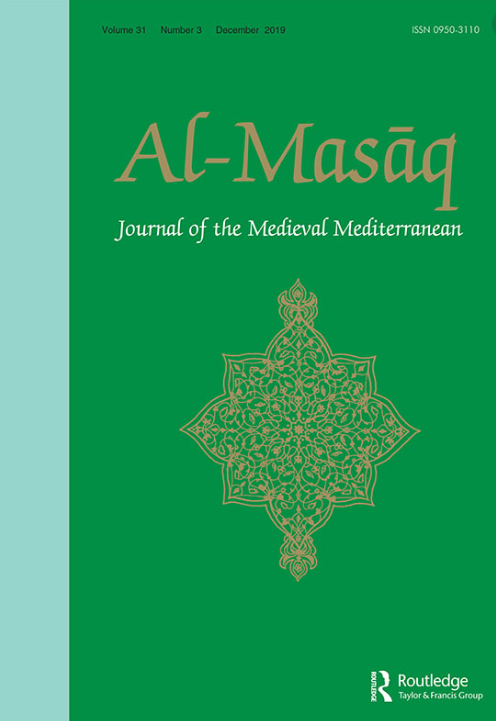
Al-Masaq
Volume 32 Issue 1Special Issue: Cities and Citizenship after Rome
Introduction: Cities and Citizenship after Rome: Introduction by Sam Ottewill-Soulsby & Javier Martínez Jiménez
Civitas Romana: The Fluidity of an Ideal by Andrew Wallace-Hadrill
Local and Universal Citizenship in Works of the Cappadocian Fathers by Thomas R. Langley
Monastic Jargon and Citizenship Language in Late Antiquity by Claudia Rapp
Banished from the Company of the Good. Christians and Aliens in Fifth-Century Rome by Robert Flierman & Els Rose
Urban Identity and Citizenship in the West between the Fifth and Seventh Centuries by Javier Martínez Jiménez
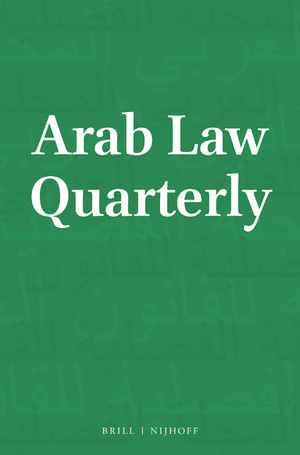
Arab Law Quarterly
Volume 34 Issue 1Penal Protection of Public Health from the Effects of Pollution in the UAE Federal Law by Ibrahim Suleiman Al Qatawneh
The Constitutional Framework of International Law in the Gulf: Ratification and Implementation of International Treaties in GCC Constitutions by Gianluca P. Parolin
The Financial and Supervisory Role of the Federal National Council in the United Arab Emirates by Ahmad Aljobair
A Decade of Development: The Civil and Commercial Court of the Qatar Financial Centre by Andrew Dahdal and Francis Botchway
A Decade of Development: The Civil and Commercial Court of the Qatar Financial Centre by Andrew Dahdal and Francis Botchway
The GCC Human Rights Declaration: An Instrument of Rhetoric? by Mustafa El-Mumin
The Libyan Supreme Court on Interest in Commercial Transactions by Kilian Bälz

Arab Law Quarterly
Volume 34, Issue 3Urbūn (Earnest Money): Legal Framework in Islamic and Positive Law and Comparison with the Call Option Contract by Laita Ibtihal Fares, Abdellah Marghich, and Mohamed Habachi
Gulf Declaration of Human Rights (GDHR) Protection against Slavery: A Double-edged Sword by Mustafa el-Mumin
The Legislative and Institutional Framework for War-affected Land Rights in Iraq: Up to the Task Post-ISIS? by Jon D. Unruh
The Carrier’s Liability for Delay under UAE Maritime Law: A Comparative Study by Eman Naboush
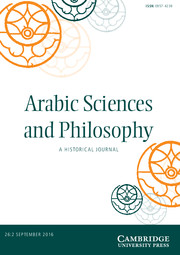
Arab Sciences and Philosophy
Volume 30 Issue 1Relation as Key to God’s Knowledge of Particulars in the Tahāfut Al-Tahāfut and the Ḍamīma: A Cross-Talk Between Averroes, Al-Ġazālī and Avicenna by Jean-Baptiste Brenet
Ibn Al-Haytham Et Le Mouvement D’Enroulement by Roshdi Rashed, Erwan Penchèvre
On the Latin Source of the Italian Version of Alhacen’s De Aspectibus (Vat. Lat. 4595) by Dominique Raynaud
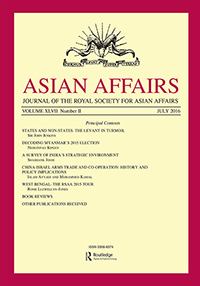
Asian Affairs
Volume 51 Issue 1Iran’s 2019–2020 Demonstrations: The Changing Dynamics of Political Protests in Iran by Afshin Shahi & Ehsan Abdoh-Tabrizi
The War in Syria: A Longue Durée Perspective by Federico Manfredi Firmian
The Rise and Fall of Islamic State: Current Challenges and Future Prospects by Hassanein Ali
The Assad-Erdogan Relationship: A Mirror Into Syrian-Turkish Ties by Kamal Alam
Iraqi Kurdistan’s 2017 Independence Referendum: The Kdp’s Public and Private Motives by Hawre Hasan Hama
Kazakhstan and Asean: The Unexplored Vector in Kazakhstan’s Foreign Policy by Paradorn Rangsimaporn
Maritime Boundaries in the Middle East by Greg Shapland
The China Factor in India-Australia Maritime Cooperation by Asha Sundaramurthy
Letter to the Editor: Talibanization and the Quest for Retrospective Legitimacy by Robin Poulton

Australian Journal of Islamic Studies
Volume 4 Issue 2The Qur’an and Interpretation in the Classical Modernism Tafsīrcentric Approach of Muhammad ʿAbduh by Hakan Coruh
The Qur’ānic Exegesis of Muhammad Asad The Mind, the Method and the Magnum-Opus by Murie Ahamed Hassan
A Brief Review and Critical Analysis of the Major Theological Positions Classical Muslim Scholars had on Whether Actions are part of Iman by Amer Ali
Qur’anic Surahs’ Names A Study on their Origin and Multiplicity by Ali Yunis Aldahesh

Australian Journal of Islamic Studies
Volume 4 Issue 3Towards Demystifying Islamophobia: A Muslim’s Perspective by Zouhir Gabsi
Human Rights and Guilt by Association: Said Nursi’s Renewal Approach by Salih Yucel
Religions and Environmental Ethics: A Comparative Study of John B. Cobb, Jr. and Seyyed Hossein Nasr by Md. Abu Sayem
Inner Peace in the Life of Said Nursi by Zuleyha Keskin
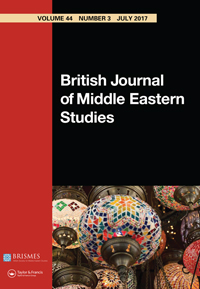
British Journal of Middle Eastern Studies
Volume 47 Issue 1Special Issue: Revisiting Rentierism: The Changing Political Economy of Resource-Dependent States in the Gulf and Arabian Peninsula
Introduction: revisiting rentierism—with a short note by Giacomo Luciani, Makio Yamada & Steffen Hertog
The ‘rentier mentality’, 30 years on: evidence from survey data by Steffen Hertog
Can a rentier state evolve to a production state? An ‘institutional upgrading’ approach by Makio Yamada
State religious authorities in rentier economies and the management of independent Islamism by Courtney Freer
‘Reform dissonance’ in the modern rentier state: how are divergent economic agendas affecting state-business relations in Saudi Arabia? By Faris Al-Sulayman
Inherent contradictions in the Saudi rentier state: distributive capacity, youth employment preferences, and attitudes to education by Mark C. Thompson
Sovereign risk: Gulf sovereign wealth funds as engines of growth and political resource by Karen E. Young
Climate action versus inaction: balancing the costs for Gulf energy exporters by Jim Krane
Re-conceptualizing civil society in rentier states by Jessie Moritz

British Journal of Middle Eastern Studies
Volume 47 Issue 2Jordan’s solution to the refugee crisis: idealistic and pragmatic education by Judith Ann Cochran
From military tutelage to civilian control: an analysis of the evolution of Turkish civil–military relations by Sertif Demir & Oktay Bingöl
Challenging the anocracy model: Iran’s foreign policy in Iraq as an obstacle to democracy? By Ronen A. Cohen
Opposition to Israel’s first Qadiya by Sarah Jacobs
Deliberating in difficult times: lessons from public forums in Turkey in the aftermath of the Gezi protests by Meral Ugur-Cinar & Cisem Gunduz-Arabaci
Remaking the public through the square: invention of the new national cosmology in Turkey by Bülent Küçük & Buket Türkmen
‘I came naïve from the village’: on Palestinian urbanism and ruralism in Haifa under the British Mandate by Na’ama Ben Ze’ev
‘Huna Baghdad’: competing visions in television programming in Monarchic Iraq by Sara Farhan
Pleading for a place in modern Egypt: negotiating poverty and patriarchy, 1908–1913 by Hoda A. Yousef
Unifying voices, creating publics: the uses of media form in contemporary Jordanian radio by Jona Fras
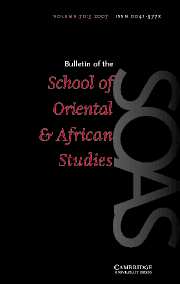
Bulletin of the School of Oriental and African Studies
Volume 83 Issue 1The broken plural in Soqotri by Leonid Kogan
Dadanitic b-rʾy as referring to a local calendar? By Fokelien Kootstra
The solitude of the Orphan: Ǧābir b. Ḥayyān and the Shiite heterodox milieu of the third/ninth–fourth/tenth centuries by Leonardo Capezzone
Gahwat al-murra: the N + DEF-ADJ syntagm and the *at > ah shift in Arabic by Phillip W. Stokes
Religion, politics and an apocryphal admonition: the German East African “Mecca letter” of 1908 in historical-critical analysis by Jörg Haustein
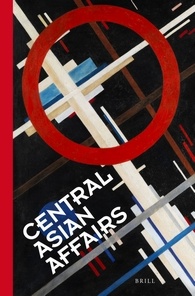
Central Asian Affairs
Volume 7 Issue 1The Bureaucratization of Islam in Azerbaijan: State as the Principal Regulator and Interpreter of Religion by Kamal Gasimov
Understanding Factors behind Regional Inequality in Education in Kazakhstan by Aigerim Kopeyeva
Secondary Schools and Inequality: Navigating the Fragmented Landscape of Educational Choices in Bishkek, Kyrgyzstan by Aigoul Abdoubaetova
Laboratory of Socialist Development: Cold War Politics and Decolonization in Soviet Tajikistan by Artemy Kalinovsky
A Model of Development by Adeeb Khalid
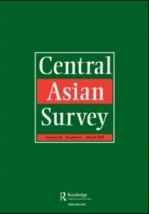
Central Asian Survey
Volume 39 Issue 1Special Issue: Informal markets and trade in Central Asia and the Caucasus
Negotiating state and society: the normative informal economies of Central Asia and the Caucasus by Susanne Fehlings & Hasan H. Karrar
Trading in Dordoi and Lilo bazaars: frontiers of formality, entrepreneurship and globalization by Philippe Rudaz
The traders of Central Bazaar, Astana: motivation and networks by Meiirzhan Baitas
The formal side of informality: non-state trading practices and local Uyghur ethnography by Rune Steenberg
Markets at sacred sites: the globalized mobility and informality of the Armenian religious fairs by Yulia Antonyan
The bazaar in ruins: rent and fire in Barakholka, Almaty by Hasan H. Karrar
Doing business in Yabaolu Market, Beijing: (inter-)ethnic entrepreneurship, trust and friendship between Caucasian and Chinese traders by Susanne Fehlings
Business 2.0: Kyrgyz middlemen in Guangzhou by Philipp Schröder
Trade ‘outside the law’: Uzbek and Afghan transnational merchants between Yiwu and South-Central Asia by Diana Ibañez-Tirado & Magnus Marsden
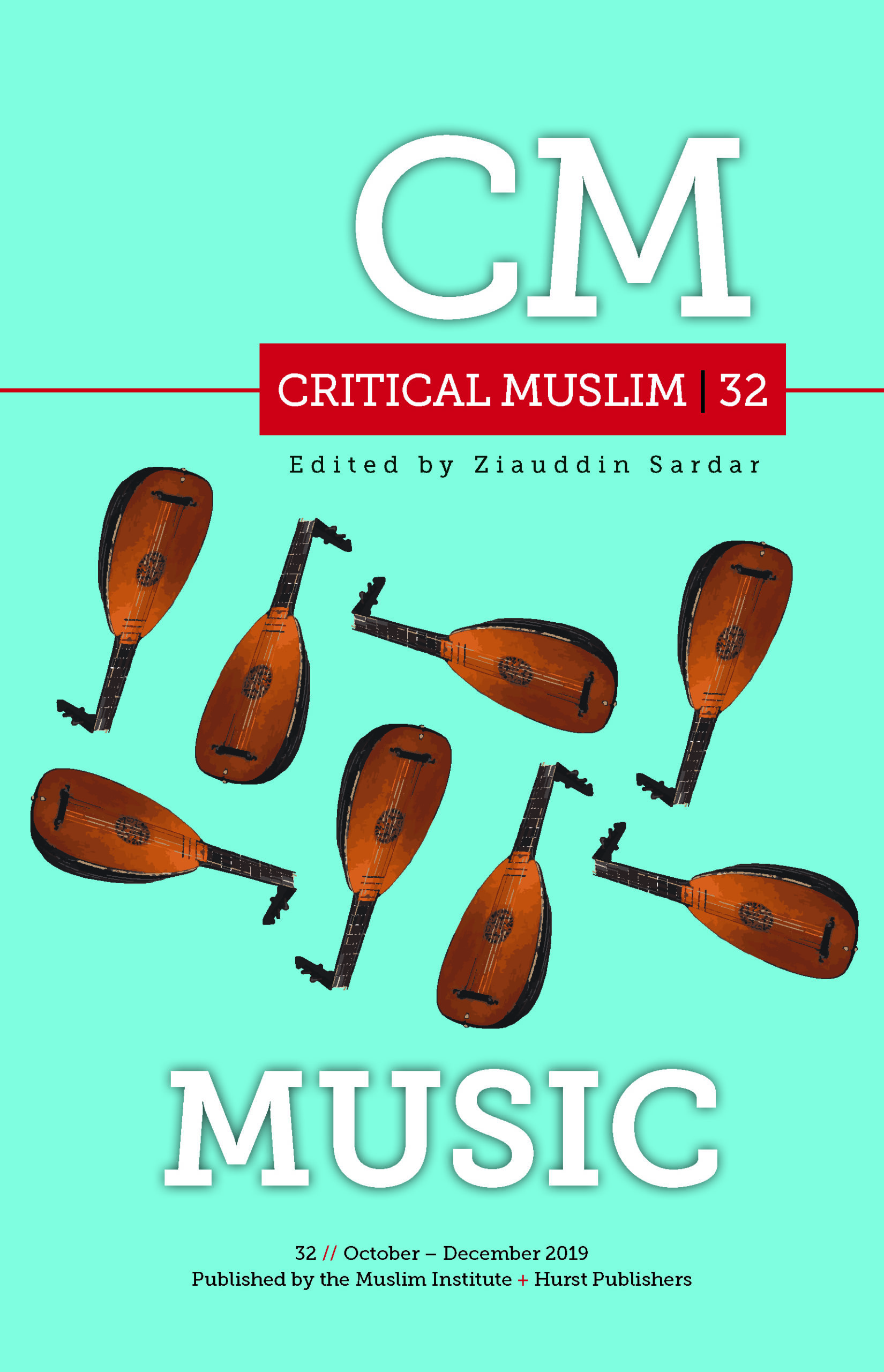
Critical Muslim (Issue 32)
Issue 32Music
Introduction: Play On by Samia Rahman
Last Word On Recycled Music by C Scott Jordan
Sufi Sounds of Senegal by Estrella Sendra
Punk Days by Hassan Mahamdallie
Hidden Windows by Jeremy Henzell-Thomas
Meena Kumari by Leyla Jagiella
Ten Non-Western One Hit Wonders
Two Poems by Latifa Nur
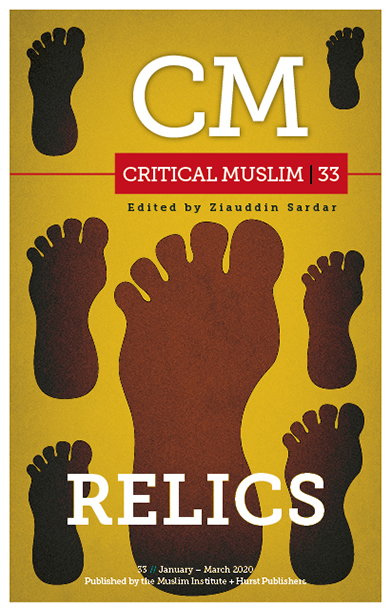
Critical Muslim
Issue 33Relics
Ignorant Antiquities by Aaron Tugendhaft
Minaretto Minaret by Leyla Jagiella
Touba by Yovanka Paquette Perdigao
Short Story: What is Saved by Aamer Hussein
Dinner at Pompeii by Iftikhar Malik
Online Muslims by Josef Linhoff
What’s in a Name? By Sahil K Warsi
Last Word: On Relics of Modernity by Liam Mayo
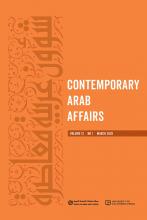
Contemporary Arab Affairs
Volume 13 Issue 1Predator Neoliberalism: Lebanon on the Brink of Disaster by Kamal Dib
Egyptian National Security and the Perils of Egyptian–Libyan Border Management: Military Strength versus International Assistance by Mona Farag
Gaddafi’s Legacy, Institutional Development, and National Reconciliation in Libya by Youssef Mohammad Sawani
Colonial Legacy in Algerian–French Relations by Salim Hamidani
China’s Impact on the Middle East and North Africa’s Regional Order: Unfolding Regional Effects of Challenging the Global Order by Jordi Quero
European Neighborhood Policy: Toward Establishing the Mediterranean as a Security Community by Djaouida Hamzaoui
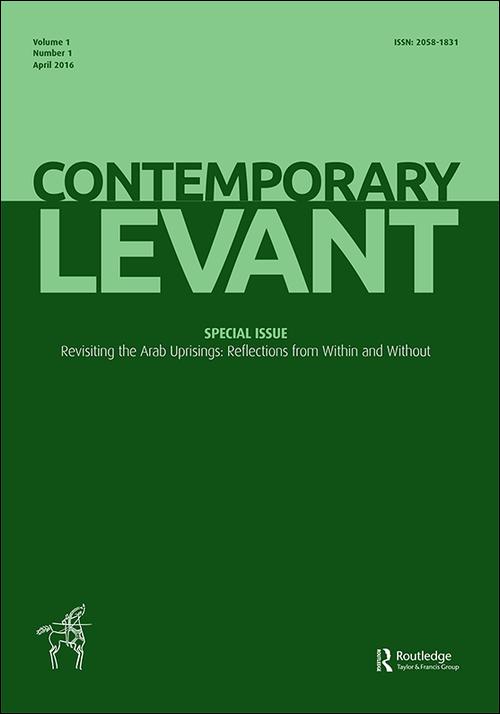
Contemporary Levant
Volume 5 Issue 1Special Issue: Levantine Chronotopes: Prisms for Entangled Histories
Levantine chronotopes: prisms for entangled histories by Rana Issa & Einar Wigen
The Levant, from utopia to chronotopia: an unsettled word for an unsettled region by Joakim Parslow
Order as a chronotope of Ottoman political writing by Alp Eren Topal
We the Semites: reading ancient history in mandate Palestine by Yoni Furas
Involuntary history: writing Levantines into the nation by Toufoul Abou-Hodeib
Terra morata: the West Bank in Menachem Begin’s worldview by Jørgen Jensehaugen
Precarious Chronotopes in Beirut: a comparative spatio-temporal analysis of Rafic Hariri’s grave and nightclub B018 by Judith Naeff
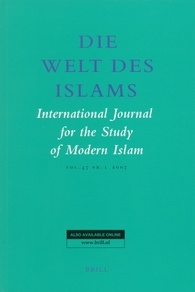
Die Welt des Islams
Volume 59 Issue 3-4Arab Shiʿism and the Shiʿa of Lebanon: New Approaches to Modern History, Contemporary Politics, and Religion by Rola El-Husseini and Mara A. Leichtman
Education and Reconfiguring Lebanese Shiʿi Muslims into the Nation-State during the French Mandate, 1920-43 by Linda Sayed
The Appeal of Communism among the Lebanese Shiʿa, 1943-75 by Jehan Al-Azzawi
Islamic Ecumenism in the Early Political Thought of Muḥammad Ḥusayn Faḍlallāh by Nabil Hage Ali
The Question of Divorce and the Mandate of the Jurist Over the Unwilling Husband in Lebanese Muslim Shiʿi Jurisprudence: A Legal Reform? by Moulouk Berry
Ḥasan Naṣrallāh’s ʿĀshūrāʾ Speeches: The Thin Line between Ethics and Identity by Bashir Saade
Iran and Hizbullah’s Development Organization in Lebanon: The Case of Jihād al-Bināʾ by Eric Lob

Die Welt des Islams
Volume 60 Issue 1Syria and Iraq as Proxy Colonies before Colonization: The Ottoman Vali versus the Western Consul in the Era of Capitulations by Mahmoud Haddad
The Struggle for the Soul of Twelver Shiʿism in Qajar Iran by Moojan Momen
Binding with a Perfect Sufi Master: Naqshbandī Defenses of rābiṭa from the Late Ottoman Empire to the Turkish Republic by M. Brett Wilson
Arab Nation-building through Detective Stories in al-Ḍiyāʾ: The Cultural Translations of Nasīb al-Mashʿalānī by Fruma Zachs and Basilius Bawardi
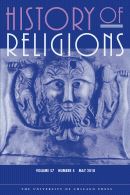
History of Religions
Volume 59 Issue 3The Living Dead of Tabriz: Explorations in Chronotopic Imagination by Shahzad Bashir
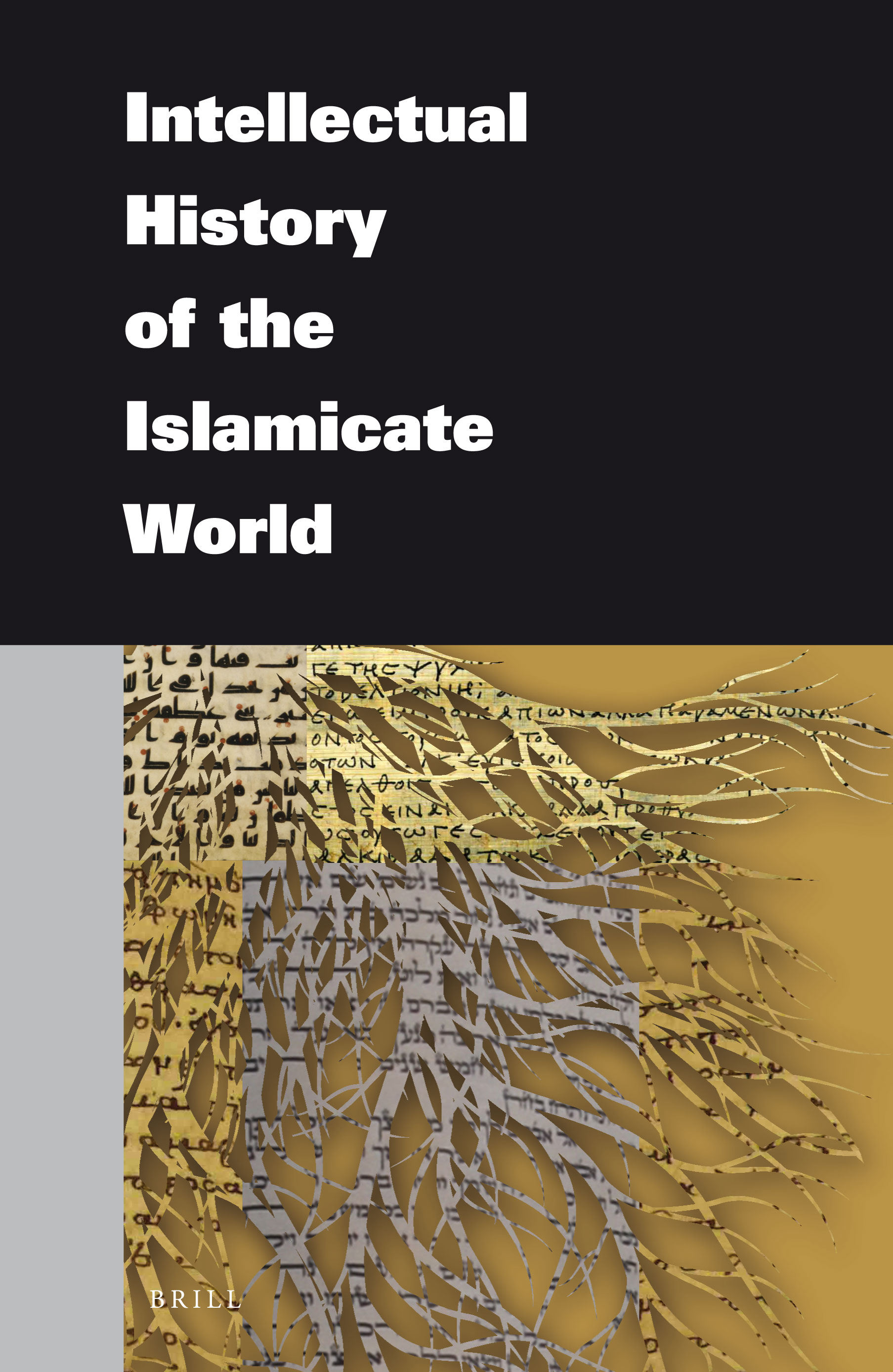
Intellectual History of the Islamicate World
Volume 8 Issue 1Special Issue: Writing in My Own Script: Allographic and Garshunographic Systems in Late Antiquity—Part 2
The Allographic Use of Hebrew and Arabic in the Samaritan Manuscript Culture by Stefan Schorch
Representation of Arabic and Syriac in the Samaritan Version of Saadya Gaon’s Translation of the Pentateuch by Tamar Zewi
Turks with a “Wāw” by E. Khayyat
The Development of Armeno-Turkish (Hayatar T‘rk‘erēn) in the 19th Century Ottoman Empire: Marking and Crossing Ethnoreligious Boundaries by Bedross Der Matossian
Spanish Islam in Arabic Script: Language, Identity, and Community Boundaries in the Literature of Religious Polemics of the Muslims of Late Medieval Christian Iberia by Mònica Colominas Aparicio
Les emplois linguistiques et culturels derrière les textes aljamiados by Nuria de Castilla
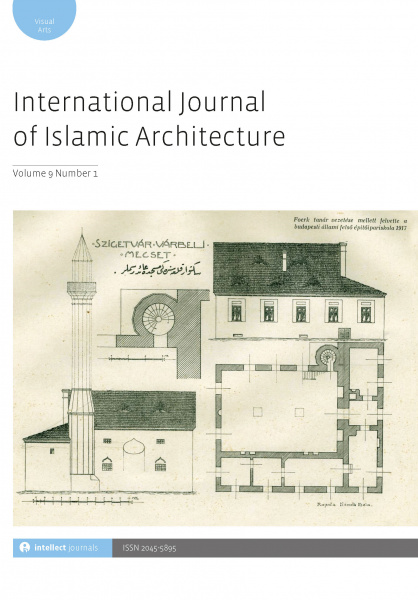
International Journal of Islamic Architecture
Volume 9 Issue 1Architectural Competitions: Creating Dialogues and Promoting Excellence? By Hasan-Uddin Khan
Can Museums Educate the Public about Islamic Art? by Sheila R. Canby
Framing ‘Islamic Art’ for Aesthetic Interiors: Revisiting the 1878 Paris Exhibition by Moya Carey and Mercedes Volait
Architectural Adventurism in Nineteenth-Century Colonial India: Begum Samru and Her Sardhana Church by Jyoti Pandey Sharma
Barbarism Begins at Home: Islamic Art on Display in Palermo’s Museo Nazionale and Sicilian Ethnography at the 1891‐92 Esposizione Nazionale by Dana Katz
The Masjid al-Haram: Balancing Tradition and Renewal at the Heart of Islam by Muhsin Lutfi Martens
Rethinking the Architecture of Shushtar-Nou: A Forgotten Episode of Architectural Regionalism in 1970s Iran by Mohamad Sedighi,
The Preservation of Ottoman Monuments in Hungary: Historical Overview and Present Endeavours by Gergő Máté Kovács and Péter Rabb
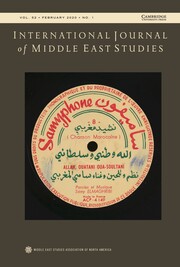
International Journal of Middle East Studies
Volume 52 Issue 1Beyond the Nation-State: A Network Analysis of Jewish Emigration From Northern Morocco to Israel by Aviad Moreno
The Sounds of Nationalism: Music, Moroccanism, and the Making of Samy Elmaghribi by Christopher Silver
“It’s Too Much!”: Victims of Gender-Based Violence Encounter the Moroccan State by Katja Žvan Elliott
Emasculating Humor From Algeria’s Dark Decade, 1991–2002 by Elizabeth M. Perego
Palestinian Doctors Under the British Mandate: The Formation of a Profession by Liat Kozma and Yoni Furas
A Transregional Persianate Library: The Production and Circulation of Tadhkiras of Persian Poets in the 18th and 19th Centuries by Kevin L. Schwartz
Roundtable: “Why Decolonization?
Why Decolonization? By Cyrus Schayegh, Yoav Di-Capua
Finding the Middle East of the Insurgent Global South by Jeffrey James Byrne
Decolonizing the Figure of the Migrant, or What Does Palestine Teach Us About the Migrant Question? By Olivia C. Harrison
On the Margins of the Arab World? By David Stenner
“Run naked towards the sun/Raise your barricades/Make your Revolution”: Poetic Revolution and Postcolonial Discourse by Paraska Tolan Szkilnik
Transnational Peoples of Color: Black Power in America and the Middle East by Michael R. Fischbach
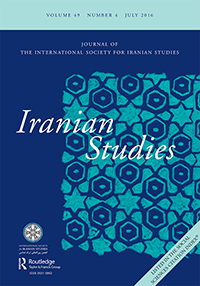
Iranian Studies
Volume 53 Issue 1-2Special Section: Medicine and Public Health in Modern Iran:Historical and Sociological Perspectives
Medicine and Public Health in Modern Iran: Historical and Sociological Perspectives by Amir A. Afkhami
Qalʿeh-ye Mehrab Khan: The First Leprosarium in Iran by Willem Floor
Sanitized Modernity: Rural Public Health in Mid-Twentieth Century Khuzestan by Bryan Sitzes
Iran–US Public Health Cooperative Organization (PHCO): Education, Healthcare, and Health Services in the Southwest of Iran (Fars), 1950–60 by Soleyman Heidari
The Integration of Mental Health Care in Rural Iran by Alex Keivahn Smith
The Journey of Infertility from Private Sphere to Public Domain: From Cosmetic Surgery to Disability by Soraya Tremayne
Performing Trans in Post-Revolutionary Iran: Gender Transitions in Islamic Law, Theatre, and Film by Emily O’Dell
A Yezidi Manuscript:—Mišūr of P’īr Sīnī Bahrī/P’īr Sīnī Dārānī, Its Study and Critical Analysis by Dimitri Pirbari, Nodar Mossaki & Mirza Sileman Yezdin
The Yezidi Wednesday and the Music of the Spheres by Artur Rodziewicz
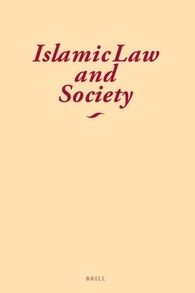
Islamic Law and Society
Volume 27 Issue 1-2Special Issue: Islam and Politics: From the Margins to the Center
Islam and Politics: From the Margins to the Center by Aaron Rock-Singer
Islamic Law on the Provincial Margins: Christian Patrons and Muslim Notaries in Upper Egypt, 2nd-5th/8th-11th Centuries by Lev Weitz
Scholars, Spice Traders, and Sultans: Arguing over the Alms-Tax in the Mamluk Era by Joel Blecher
Leading with a Fist: A History of the Salafi Beard in the 20th-Century Middle East by Aaron Rock-Singer
Islamic Charity as (Non)Political in Contemporary Egypt by Amira Mittermaier
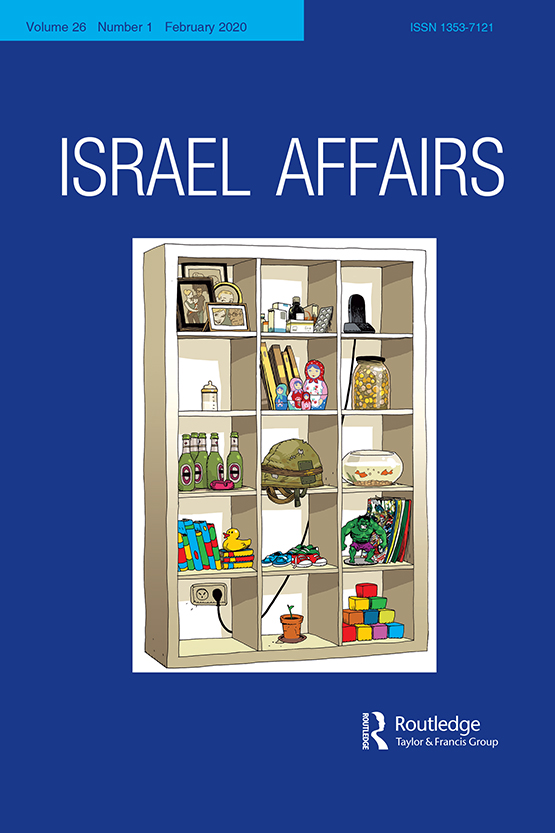
Israel Affairs
Volume 26 Issue 1Special Issue: Voice and Silence in Contemporary Israeli Society
Silence in a 9-panel grid: the voice of Israeliness in Asaf Hanuka’s The Realist by Silvia Adler & Ayelet Kohn
The right to speak and the request to remain silent: who owns politicians’ Facebook pages? By Pnina Shukrun-Nagar
When perlocutions become silent: politicians and the right of silence – a case study by Dennis Kurzon
‘Judeo-Nazis? Don’t talk like this in my house’ voicing traumas in a graphic novel – an intertextual analysis by Ilana Elkad-Lehman
Bereaved parents in Israel: from silence to a significant participation in the public discourse by Ruvik Rosenthal
I see no problem because there is no problem: denial and silence among Israeli mental health professionals during the first Intifada by Eliezer Witztum & Ruth Malkinson
Religious Israeli Jews break the silence by performing forbidden discursive actions in a computer-mediated ‘troubles forum’ by David Green & Irit Kupferberg
“Neither here nor there” – Flattening, omission, and silencing, in the constructing of identity of Islamic girls who attend a Jewish school by Smadar Ben-Asher, Naama Sabar Ben-Yehoshua & Aya Elbedour
Rethinking voice and silence by Galia Sabar
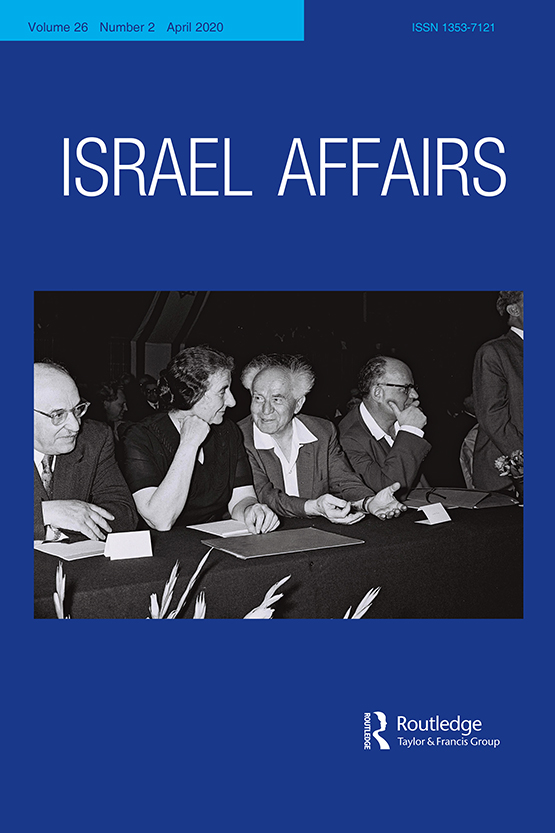
Israel Affairs
Volume 26 Issue 2Golda Meir and the 1973 Yom Kippur War by Moshe Gat
David Ben-Gurion and Golda Meir: from partnership to enmity by Eran Eldar
Tapping into the zeitgeist: Israel’s East-looking policy by Shirzad Azad
Neither sacred nor profane: Holocaust representations in Israeli sports media by Ilan Tamir & Moshe Levy
Cooperation between the Galilee Bedouins and the Yishuv during the 1948 war by Muhammad Suwaed
The International League for the rescue of the Jews in Arab countries by Moshe Naor
Conflict escalation in the Middle East revisited: thinking through interstate rivalries and state-sponsored terrorism by Akbar Khan & Han Zhaoying
A model for judging complex events in an intercultural situation by Nirit Rauchberger, Shlomo Kaniel & Zehavit Gross
Interwar Jewish women sports clubs in Warsaw by Joanna Banbula
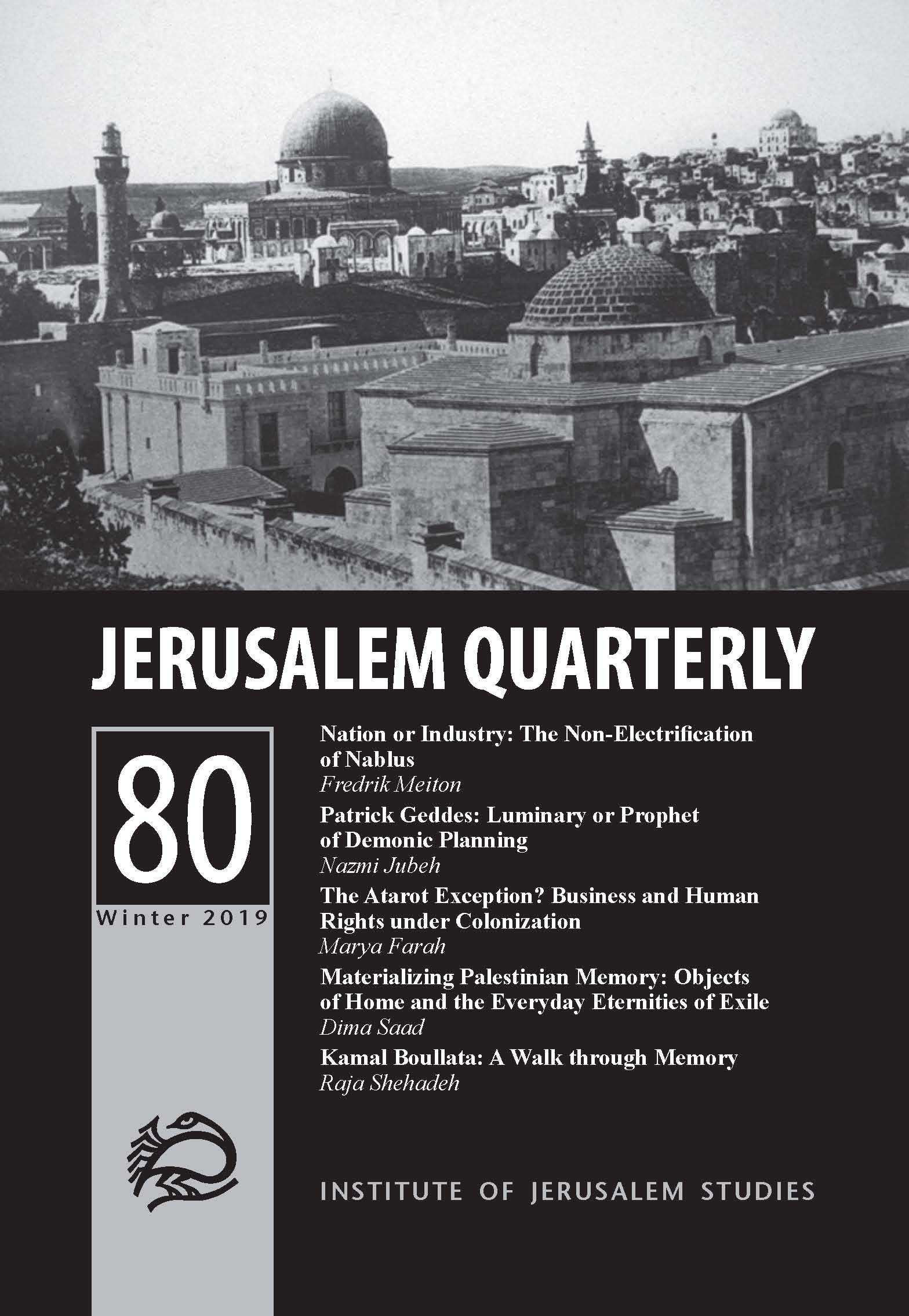
Jerusalem Quarterly
Volume 80Materiality and Ghostliness
Nation or Industry: The Non-Electrification of Nablus by Fredrik Meiton
Patrick Geddes: Luminary or Prophet of Demonic Planning by Nazmi Jubeh
The Atarot Exception? Business and Human Rights under Colonization by Marya Farah
Materializing Palestinian Memory: Objects of Home and the Everyday Eternities of Exile by Dima Saad
Palestine at the Centennial Fair of 1876 by Linda K. Jacobs
From “Rag-and-Tatter Town” to Booming-and- Bustling City: Remembering Mildred White and Ramallah by Donn Hutchison
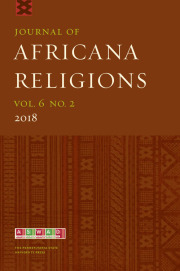
Journal of Africana Religions
Volume 8 Issue 1“Pulpit and Pew”: African American Humor on Irreverent Religious Participation in John H. Johnson’s Negro Digest, 1943–1950 by Vaughn A. Booker
Embodying the Mahdi: Islamic Messianism and the Body in Colonial Senegal by Jeffry R. Halverson
Killmonger’s Quandary: Notes on Religious Meaning, Freedom, and Identity in Black Panther by Darrius Hills
A Matter of Time: Spirit Possession and the Temporalities of School in Niger by Adeline Masquelier
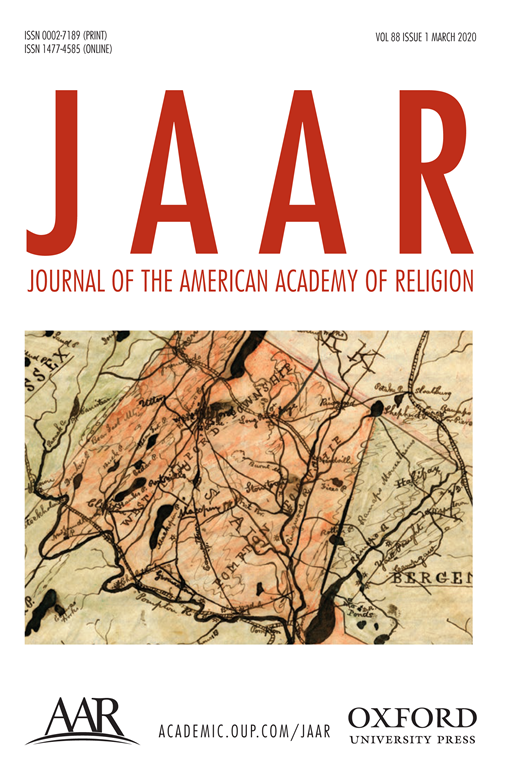
Journal of the American Academy of Religion
Volume 88 Issue 1Roundtable: What Comes After the Critique of Secularism?
Introduction by Udi Greenberg, Daniel Steinmetz-Jenkins
The Logic of Sanctuary: Towards a New Spatial Metaphor for the Study of Global Religion by James Chappel
Remembering Marx’s Secularism by Joseph Blankholm
Rescuing Liberalism from Critical Religion by Cécile Laborde
Is Religious Freedom Protestant? On the History of a Critical Idea by Udi Greenberg
Discussing the Discipline
A Comparative-Informational Approach to the Study of Religion: The Chinese and Jewish Cases by Yair Lior
Good Scholarship/Bad Scholarship: Consequences of the Heuristic of Intersectional Islamic Studies by Sohaira Siddiqui
Whither Whiteness and Religion?: Implications for Theology and the Study of Religion by Rachel C Schneider, Sophie Bjork-James
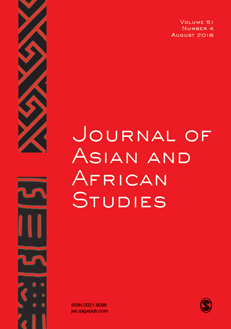
Journal of Asian and African Studies
Volume 55 Issue 2Political Settlements and Bureaucratic Reforms: An Exploratory Analysis Focusing on Bangladesh by Abu Elias Sarker, Habib M. Zafarullah
Understanding Homelessness in Neoliberal City: A Study from Delhi by Subhamay Ghosh
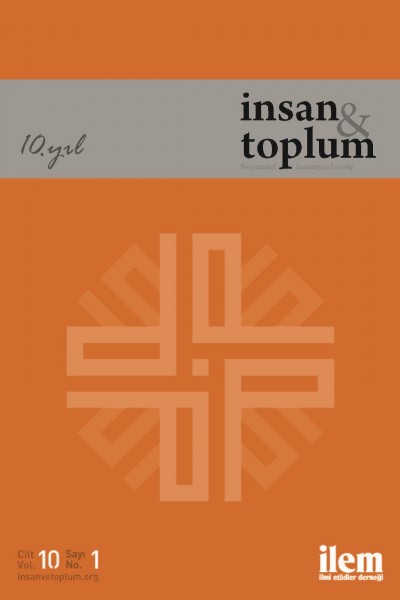
Journal of Humanity and Society
Volume 10 Issue 1The Spillover Effect of Divorce Rates on Marriage: Findings from Turkey by Zeynep Uğur
The Role of the Taqriz Genre in Biographies and Reestablishing the Ulama Circles The Case of Emirî by Güler Doğan Averbek
Conservative Fashion Magazines in the Context of Consumption Culture in Turkey A Comparison of Conservative and Secular Fashion Magazines with the Case of Aysha and Elle by Aydın Kaymak and Mehmet Emin Babacan
Motherhood Narratives of Executive Women Working in the Private Sector Experiences, Expectations and Motherhood Ideologies by Meral Timurtürkan
Lives Without a Last Stop Rural Migrant, Return Migration, and Practice of Multiple Place by Cenk Beyaz
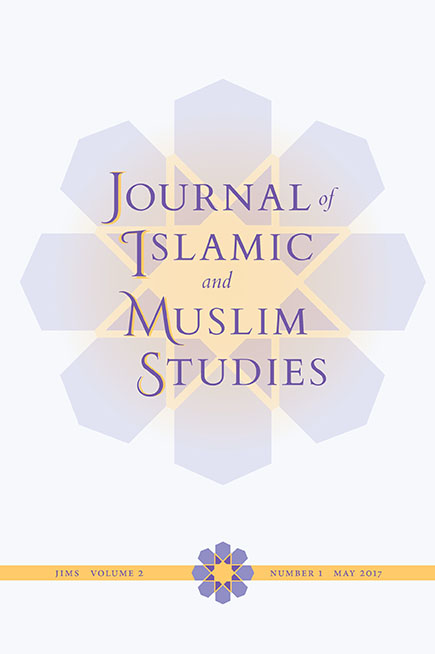
Journal of Islamic and Muslim Studies
Volume 4 Issue 2Love and Marriage in Medieval Muslim Thought by Aisha Y. Musa
Divorce: A View from Abbasid Adab Collections by Nadia Maria El Cheikh
Earnest and Jest from Political Crisis to Marriage Problems: Ibn Abī Ṭāhir Ṭayfūr’s (Instances of) The Eloquence of Women by Jocelyn Sharlet
Zulaykhā’s Displaced Desire in Jāmī’s Yūsuf va Zulaykhā by Claudia Yaghoobi
Western Theory Meets Eastern Praxis: Continuity and the Amatory Prelude in Pre-Islamic/Early Islamic Poetry by Eid Mohamed and Talaat Farouq Mohamed
Soteriology in ‘Abd al-Karīm al-Jīlī‘s Islamic Humanism by Rahimjon Abdugafurov
Muslim Communities in Europe and North America: Contemporary Developments and Challenges by Layla Sein
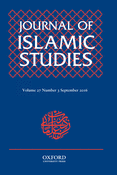
Journal of Islamic Studies
Volume 31 Issue 1Dreams of Destiny and Omens of Greatness: Exceptionalism in Ottoman Political and Historical Thought by Ethan L Menchinger
To Flower and Fructify: Rational Religion and the Seeds of Islam in Nazir Ahmad’s (1830–1912) Late-career Religious Non-fiction by Elizabeth Lhost
The Kalām-i pīr and its place in the Central Asian Ismaʿili Tradition by Daniel Beben
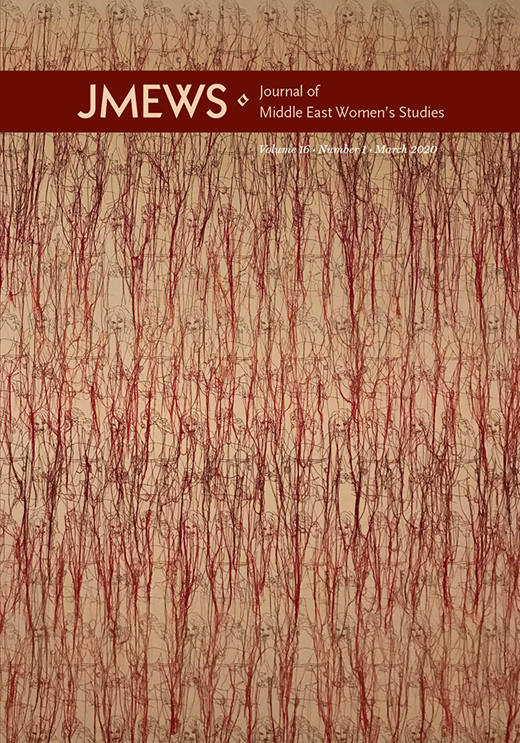
Journal of Middle East Women’s Studies
Volume 16 Issue 1Caught in the Crosshairs: Confronting Compulsory Unveiling in Faiza Ambah’s Mariam by Nadine Sinno
Sonallah Ibrahim and Miriam Naoum’s Zaat: Deploying the Domestic in Representations of Egyptian Politics by Sara Salem
“Not a Figure in the Past”: Zionist Imperial Whiteness, the Iraqi Communist Party, and Their Reverberating Histories of Race and Gender, 1941–1951 by Chelsie May
Liminalities of Gender and Sexuality in Nineteenth-Century Iranian Photography: Desirous Bodies by Farshid Kazemi
Economic Citizenship: Neoliberal Paradoxes of Empowerment by Sara Salem
Arab Family Studies: Critical Reviews by Randa Tawil
The Right to Maim: Debility, Capacity, Disability by Stephen Sheehi
Cover Art Concept by Anne Marie E. Butler
Writing the Silenced Body: Notes on the Flesh by Shahd Alshammari
Reversing the Domestic Gaze: Chaza Charafeddine’s Maidames Exhibition in Beirut by Yasmine Nachabe Taan
Zaʾfaraan: A Space for Creative Expression of LGBTQ Folks in the MENA/SWANA Region by Layle Omeran; Kayan
Displacement, War, and Exile in Simone Fattal’s Works and Days by Miriam Cooke
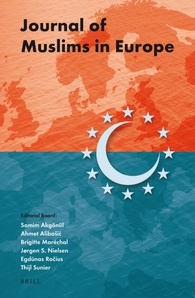
Journal of Muslims in Europe
Volume 9 Issue 1The Umma in Italy: Eurocentric Pluralism, Local Legislation, Courts’ Decisions. How to Make the Right to Worship Real by Giancarlo Anello
Fighting Fire with Fire? “Muslim” Political Parties in the Netherlands Countering Right-Wing Populism in the City of Rotterdam by Sakina Loukili
Conflicts in and around Space: Reflections on ‘Mosque Conflicts’ by Martin Lundsteen
“I’m just an Imam, not Superman” Imams in Switzerland: Between Stakeholder Objects and Self-Interpretation by Hansjörg Schmid
Muslim Organisations’ Response to Stigmatisation in the Media: Protest, Adaptation or Decoupling by Aida Kassaye and Anja van Heelsum
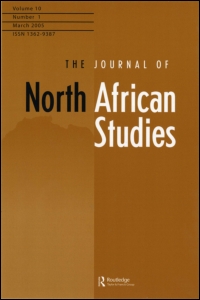
Journal of North African Studies
Volume 25 Issue 1Where does Libya go now? By George Joffé
Social media in democratic transitions and consolidations: what can we learn from the case of Tunisia? By Magdalena Karolak
Mobilization structures and political change in an authoritarian context: the national association for change as a case study (2010–2011) by Shaimaa Magued
Unemployed mobilisation in times of democratisation: the Union of Unemployed Graduates in post-Ben Ali Tunisia by Irene Weipert-Fenner
Migrations in Moroccan cinema (1958–2015): main thematic lines and evolution by Lidia Peralta García
Marine heterotopia and odyssean nomadism in Malika Mokeddem’s N’zid by Fella Benabed

The Journal of North African Studies
Volume 25 Issue 2Shame-faced no longer? By George Joffé
Wine, love or divine love? Analysing three short traditional Algerian Sha’bî Songs by Samia Touati
‘Spiritual security’ as a (meta-)political strategy to compete over regional leadership: formation of Morocco’s transnational religious policy towards Africa by Salim Hmimnat
The emigrant political participation in Morocco and Tunisia: diasporic civil society and the transnationalization of citizenship in the Arab Spring context by Mourad Aboussi
Voting for secular parties in the Middle East: evidence from the 2014 general elections in post-revolutionary Tunisia by H. Ege Ozen
Dynamics of engagement among youth in Arab Mediterranean countries by Henri Onodera, Bruno Lefort, Karim Maiche & Sofia Laine

The Journal of North African Studies
Volume 25 Issue 3The outcomes of 2011 by George Joffé
Investigating the invisible roots of a prevailing narrative of farmers’ failed collective action in Morocco by Zhour Bouzidi, Nicolas Faysse, Marcel Kuper & Jean-Paul Billaud
The genesis of the Moroccan novel in Arabic: a review of the origins of the modern fusion of mature domestic and imported literary forms by Mbarek Sryfi
Informal empire and international law in Tunisia after the French Revolution by Dzavid Dzanic
The Catholic Church in Tunisia: a transliminal institution between religion and nation by Alexis Artaud de La Ferrière
The economic bases of migration from Italy: the distinct cases of Tunisia and Libya (1880s–1960s) by Francesca Fauri & Donatella Strangio
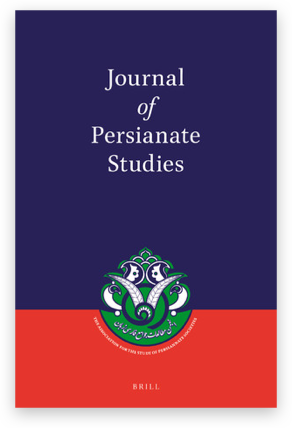
Journal of Persianate Studies
Volume 12 Issue 2Introduction: Kingship and Political Legitimacy in the Persianate World by Kazuo Morimoto
The Hazaraspid Dynasty’s Legendary Kayanid Ancestry: the Flowering of Persian Literature under the Patronage of Local Rulers in the Late Il-khanid Period by Osamu Otsuka
The Jalayirid Hidden King and the Unbelief of Shāh Mohammad Qara Qoyunlu by Evrim Binbaş
In This Corner of the Entangled Cosmopolises: Political Legitimacies in the Multilingual Society of Sultanate and Early Mughal Kashmir by Satoshi Ogura
How to Found a New Dynasty: The Early Qajars’ Quest for Legitimacy by Nobuaki Kondo
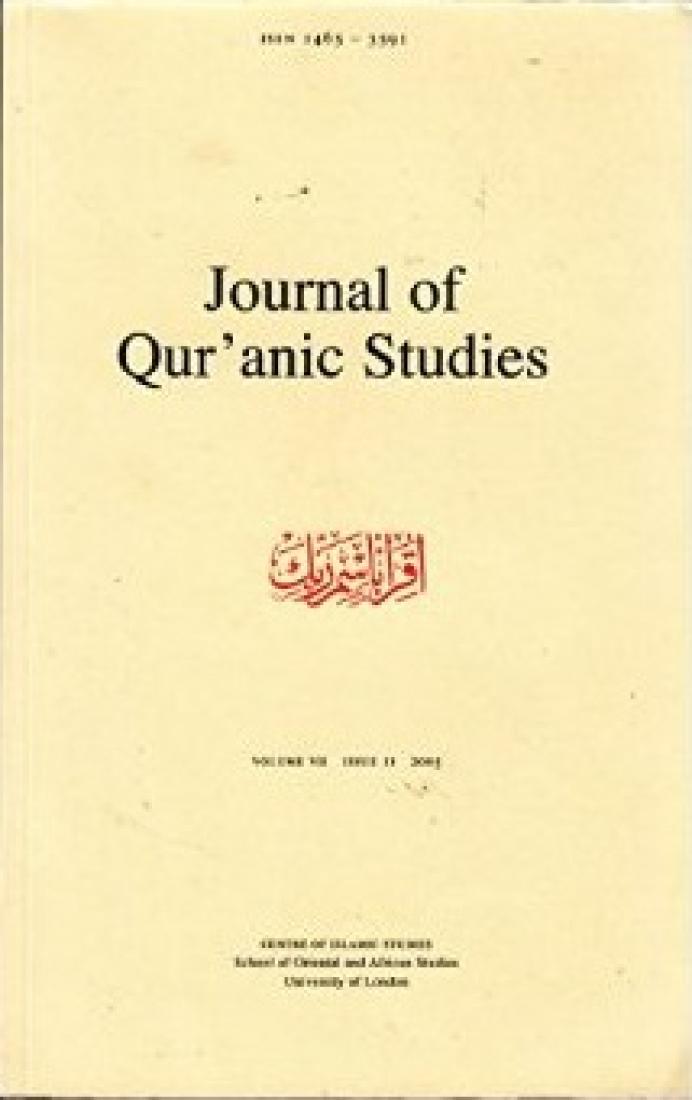
Journal of Qur'anic Studies
Volume 22 Issue 1Introduction. Originating Canons and Communities: Theories of Language and Rhetoric in the Qur’an, the Bible, and Exegetical Literatures by Ulrika Mårtensson and Tor Ivar Østmoe
The Appealing Qur’an: On the Rhetorical Strategy of Vocatives and Interpellation in the Qur’an by Thomas Hoffmann
Divine Sensations: Sensory Language and Rhetoric in Bernard of Clairvaux’s ‘On Conversion’ by Line Cecilie Engh
The sabab-khāṣṣ—ʿāmm Process as an Instructional Technique within Qur’anic Rhetoric by Ramon Harvey
God Loves not the Wrongdoers (ẓālimūn): Formulaic Repetition as a Rhetorical Strategy in the Qur’an by Johanne Louise Christiansen
Conceptions of Language and Rhetoric in Ancient and Medieval Judaism by Lewis Glinert
The Evidence of Meaning (bayān al-maʿnā) in the Ẓāhirī Approach to the Qur’an by Massimo Campanini
The Vocabulary of Revelation: Divine Intent and Self-Disclosure in the Qur’an by Asma Afsaruddin
Prophetic Clarity: A Comparative Approach to al-Ṭabarī’s Theory of Qur’anic Language, Rhetoric, and Composition by Ulrika Mårtensson
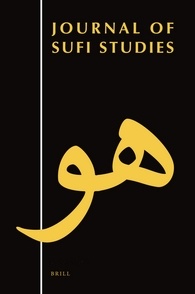
Journal of Sufi Studies
Volume 8 Issue 1Dreams and Visions as Diagnosis in Medieval Sufism: The Emergence of Kubrawī Oneirology by Eyad Abuali
The Origins and Evolution of Sufi Communities in South Asia Revisited by Blain Auer
Arabic Literature of the North Caucasian Naqshbandiyya in the 19th Century
Shaykh Jamāl al-Dīn al-Ghāzīghumūqī’s Treatise al-Ādāb al-Marḍiyyafī l-Ṭarīqa al-Naqshbandiyya and Its Khālidiyya Tendencies by Gülfem Alıcı
Sanctity, Orality and Questions about Cultural and Religious Identity in North Morocco: The Case of Lallā ʿĀʾisha al-Khaḍrāʾ, Saint of Alcazarquivir by Rachid El Hour
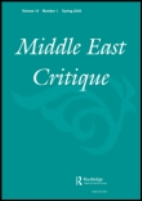
Middle East Critique
Volume 29 Issue 1Special Issue on Queering the Middle East
Guest Editor’s Introduction: Queerness with Middle East Studies: Mapping out the Useful Intersections by Walaa Alqaisiya
Different Normativity and Strategic ‘Nomadic’ Marriages: Area Studies and Queer Theory by Sabiha Allouche
Who is “Queerer” and Deserves Resettlement?: Queer Asylum Seekers and Their Deservingness of Refugee Status in Turkey by Mert Koçak
Queer/Humanitarian Visibility: The Emergence of the Figure of The Suffering Syrian Gay Refugee by Fadi Saleh
Duffs and Puffs: Queer Fashion in Iranian Cyberspace by Ladan Rahbari
Palestine and the Will to Theorise Decolonial Queering by Walaa Alqaisiya
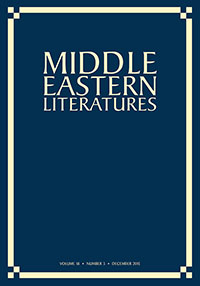
Middle Eastern Literatures
Volume 22 Issue 1Muḥammad Khuḍayyir from Saddam Hussein to the gardens of the south: writing the self in postcolonial Basra by Fabio Caiani & Catherine Cobham
Diasporic slippages: accent and dialect in translation by Dima Ayoub
Pagan or Muslim? “Structures of feeling” and religious ambiguity in al-Khansāʾ by M. Hammond
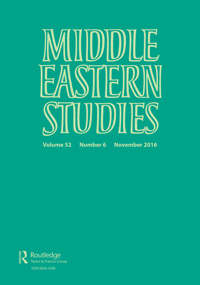
Middle Eastern Studies
Volume 56 Issue 1Ahmad Qabil, a reason to believe and the New Religious Thinking in Iran by Lloyd Ridgeon
Between being ‘Irticaci’ and ‘Kafir’: the Kurdish Ulama, Shayhks and Kurdish historiography by Gulsum Gurbuz-Kucuksari
Hashemites, Egyptians and Saudis: the tripartite struggle for the pilgrimage in the shadow of Ottoman defeat by Joshua Teitelbaum
Public space security and contentious politics of Morocco’s Rif protests by Noureddine Jebnoun
Two decades of Bedouin resistance and survival under Israeli military rule, 1948–1967 by Mansour Nasasra
Italy and its oil dealings with Libya. Limits and obligations of a dependency: the difficult 1970s and 1980s by Silvio Labbate
Dispatches from Baghdad: sectarian war in Iraq, 2006–2007 by Edward Hunt
Sri Lanka and the Middle East by Michael B. Bishku
A review of the Turco-Italian war of 1911–1912 and related letters of Enver Pasha by Syed Tanvir Wasti

Middle Eastern Studies
Volume 56 Issue 2The new visual culture in eighteenth-century Istanbul: building up new shore kiosks and gardens on the outskirts of the royal palace by Ahmet Erdem Tozoglu
Greasing the wheels: the Berlin-Baghdad railway and Ottoman oil, 1888–1907 by Volkan Ş. Ediger & John V. Bowlus
Remnants of empires: Russian refugees and citizenship regime in Turkey, 1923–1938 by Pınar Üre
Veiled memories: an ethnography of the single-party regime in Turkey by Ramazan Aras
The 1931 census of Palestine and the statistical (un)making of an Arab landless class by Isaac Sasson & Ronen Shamir
Old Arabs, new Arabs: debating Palestinian pedagogy during the mandate by Yoni Furas
Ralph Bunche and the 1949 armistice agreements revisited by Elad Ben-Dror
Patronage and development in the Israeli Negev: Yeruham, 1952–1953 by David Motzafi-Haller
Perception and reality in US-Lebanon relations by Jacob Abadi

Middle Eastern Studies
Volume 56 Issue 3The roots and the consequences of the 1979 Iranian revolution: A Kurdish perspective by Marouf Cabi
Intellectual struggles of Kurdish ulema in a post-colonial world: the case of Mullah Ali Zile by Gulsum Gurbuz-Kucuksari
Survival of the Kuwaiti statelet: Najd’s expansion and the question of British protection by Ash Rossiter
A people that shall dwell alone; is that so? Israel and the minorities alliance by Yusri Hazran
On the frontier of integration: the Histadrut and the Palestinian Arab citizens of Israel by Arnon Degani
Kemalist Turkey and the Palestinian question, 1945–1948 by Tuba Ünlü Bilgiç & Bestami S. Bilgiç
Remembering the tatas: an oral history of the Tetouan elite about their female domestic slaves by Josep Lluís Mateo Dieste
From ‘people’s education’ to people’s entertainment: the changing role of cinema in Turkey’s People’s Houses (1932–1950) by Özgür Adadağ
On the short but eventful life of Abdülhalîm Memdûh by Syed Tanvir Wasti
Imagining Turan: homeland and its political implications in the literary work of Hüseyinzade Ali [Turan] and Mehmet Ziya [Gökalp] by Ioannis N. Grigoriadis & Arzu Opçin-Kıdal
The problematic notion of the ‘Islamic state’ in the discourses of contemporary Islamists: the case of Sheikh Muhammad Abu Zahra (1898–1974) by Sami E. Baroudi
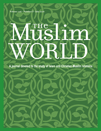
The Muslim World
Volume 110 Issue 1Special Issue: Nation‐Building in Central Asia
Introduction to the Special Issue by Mehran Kamrava
Nation‐Building in Central Asia: Institutions, Politics, and Culture by Mehran Kamrava
Multiculturalism and Nation‐Building in Kazakhstan: Trends in Media Discourse, State Policy, and Popular Perceptions by Aziz Burkhanov
World War II Rhetoric in the Context of Kyrgyzstani Labor Migration: Nation‐Building and Emotional Investment in Kyrgyzstan by Ruslan Rahimov Chyngyz Jumakeyev
Islam in the Context of Nation‐Building in Kyrgyzstan: Reproduced Practices and Contested Discourses by Mukaram Toktogulova
Functions of Religion and Dynamics of Nation‐Building in Kazakhstan and Uzbekistan by Laura G. Yerekesheva
Perceptions of National Identity in Kazakhstan: Pride, Language, and Religion by Dina Sharipova
Nations of Plov and Beshbarmak: Central Asian Food and National Identity on the Internet by Aida Aaly Alymbaeva
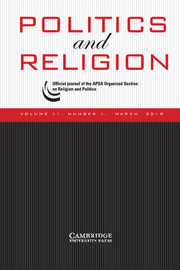
Politics and Religion
Volume 13 Issue 1Homeland Violence and Diaspora Insecurity: An Analysis of Israel and American Jewry by Ayal K. Feinberg
Does establishment suppress the political activities of religious congregations? Evidence from Switzerland by Jörg Stolz, Christophe Monnot
American Constitutional Faith and the Politics of Hermeneutics by Andrew R. Lewis, William D. Blake, Stephen T. Mockabee, Amanda Friesen
Who Wants to Make America Great Again? Understanding Evangelical Support for Donald Trump by Michele F. Margolis
Euroscepticism and Protestant Heritage: The Role of Religion on EU Issue Voting by Margarete Scherer
Untold Story of Boko Haram Insurgency: The Lake Chad Oil and Gas Connection by J. Tochukwu Omenma
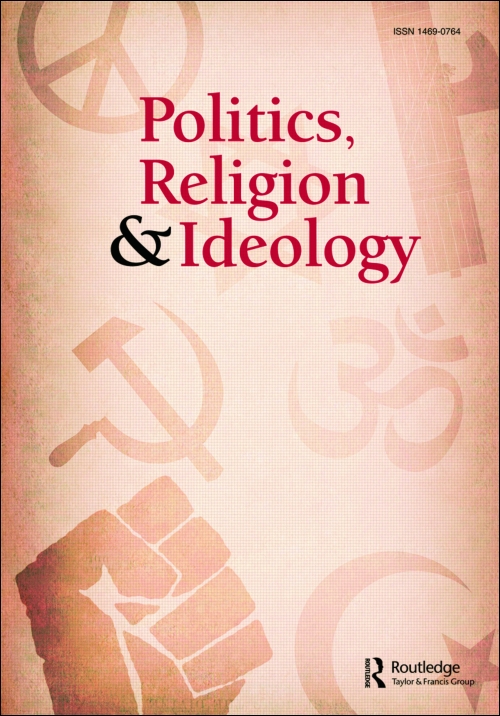
Politics, Religion & Ideology
Volume 20 Issue 4In Hoc Signo Vinces: The Politics of Religion as a Source of Power and Conflict by Albert Doja
Similar Contexts, Different Behaviour: Explaining the Non-Linear Moderation and Immoderation of Islamic Political Parties in Jordan, Morocco, Tunisia, and Turkey by Esen Kirdiş
See also: Review Forum: Religion as Critique: Islamic Critical Thinking from Mecca to the Marketplace

Politics, Religion & Ideology
Volume 21 Issue 1Community-Based Organizations Motivated by Religious Ideology as A Driving Force Behind Shaping Urban Governance: The Israeli Case by Yitzhak Dahan
Caliphate, Hijrah and Martyrdom as Performative Narrative in ISIS Dabiq Magazine by Erkan Toguslu
Religious Socialism in Post-Secular Europe by Robert Michael Bosco

Review of Middle East Studies
Volume 53 Issue 2Special Focus: The Online Public Sphere in the Gulf
The Online Public Sphere in the Gulf: Contestation, Creativity, and Change by Sahar Khamis
#Blockade: Social Media and the Gulf Diplomatic Crisis by Jocelyn Sage Mitchell
“The Distant Early Warning System”: The Online Public Sphere and the Contemporary Artistic Movement in Saudi Arabia by Sean Foley
A Storm of Tweets: Social Media Manipulation During the Gulf Crisis by Andrew Leber, Alexei Abrahams
The Consequences of Some Angry Re-Tweets: Another Medium is the Message by Geoffrey Martin
Is There an Art Scene in Abu Dhabi? by Maya Allison
Reading Teach for Arabia in Qatar: Self-Critical University Studies by Sumayya Ahmed
Before and After Bin ͑Ali : Comparing Two Attempts at Political Liberalization in Tunisia by Sabina Henneberg
Poetry, Identity, and Family: An Interview with Amal Kassir Conducted by Nina Zietlow by Amal Kassir, Nina Zietlow
Middle East Studies Association Anti Sexual Harassment Comittee August 2019 by Heather Ferguson
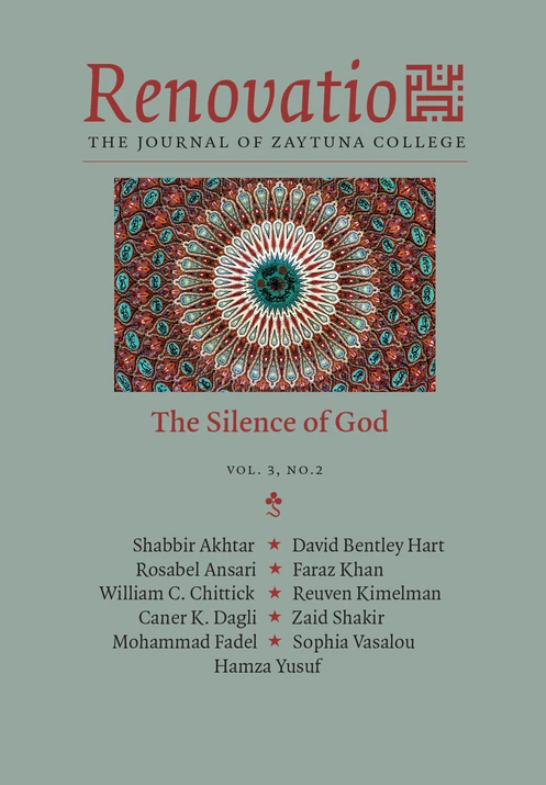
Renovatio
Volume 3 Issue 1Counting the Minutes by Sophia Vasalou
The Sound of Silence by William C. Chittick
Can an Islamic Natural Theology Explain God’s Silence Today? By Shabbir Akhtar
Do We Mistake Our Passion for Truth with Its Possession? By Reuven Kimelman
Pia Fraus: Our Words and God’s Truth by David Bentley Hart
Breaking the Cycle of Oppression by Hamza Yusuf
Muslims Are Not a Race by Caner K. Dagli
The Oneness of Being by Rosabel Ansari
After Revelation, Where Does Reason Lead? By Mohammad Fadel
Things in Their Proper Places: Justice in the Islamic Tradition by Zaid Shakir
“Everything Other Than God Is Unreal:” Exploring a Kalam Ontological Argument by Faraz Khan
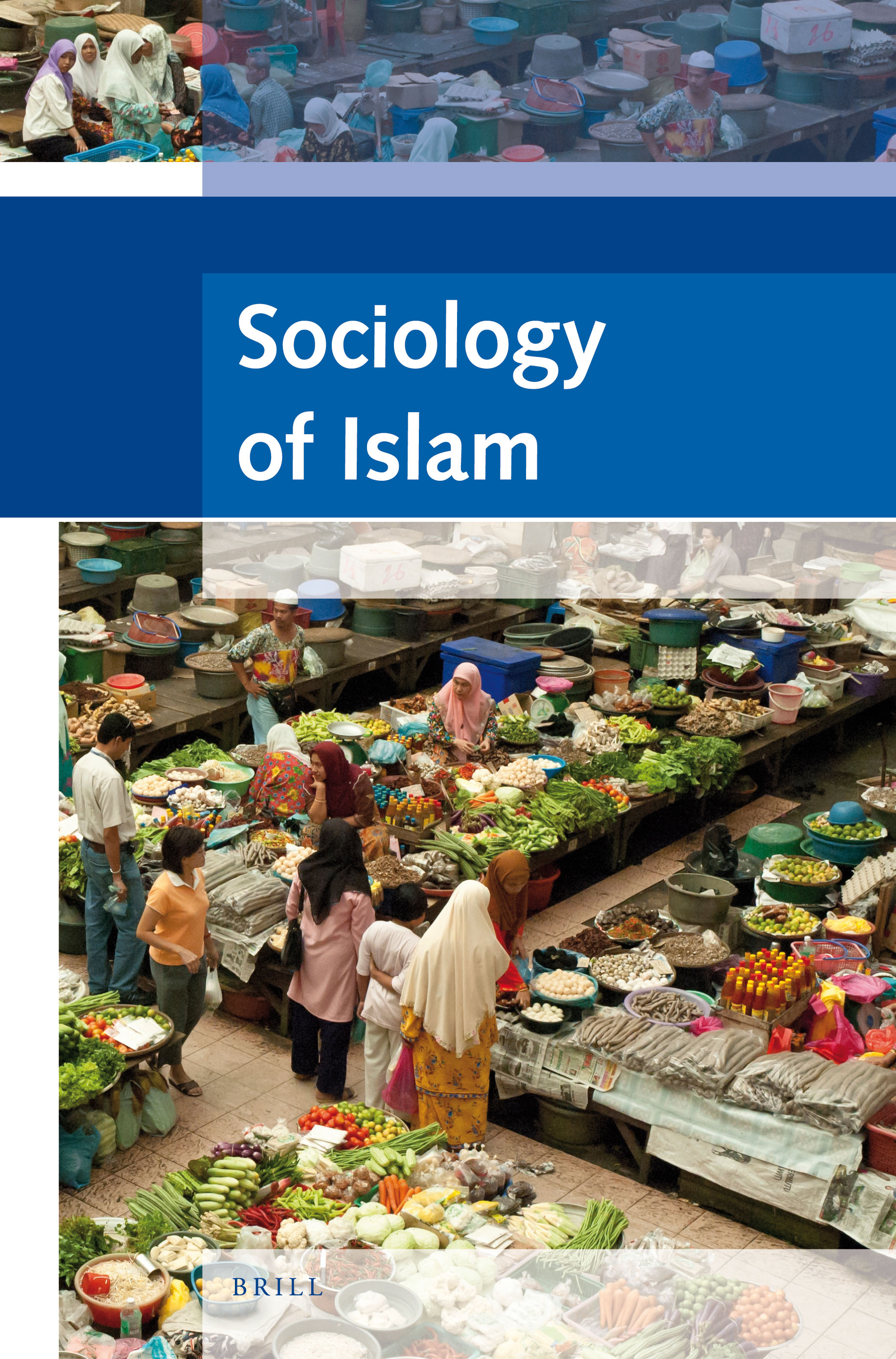
Sociology of Islam
Volume 8 Issue 1The Arabs and Iranians: What Went Wrong? And Why? by Mahjoob Zweiri and Ismail Zahirovic
Before ISIS: What Early America Thought of Islam by Firoozeh Kashani-Sabet
Religiosity, Social Influence, and Drinking Among Iranians by Bashir Tofangsazi
The Problem of the Islamic State by Milad Dokhanchi
From Radical Secularism to Islamic NationalismThe Historical Evolution of Politico-Religious Relationship in Turkey by Yang Chen
Erdogan’s Train to Authoritarianism by Michael M. Gunter
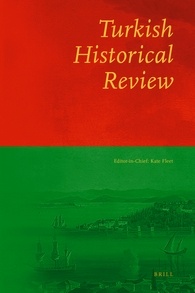
Turkish Historical Review
Volume 10 Issue 2-3Hayr ed-Dîn Barberousse : Un pacha qui n’était pas du sérail by Nicolas Vatin
Early Modern Ottoman Politics of Emotion: What Has Love Got to Do With It? by Nil Tekgül
Unseen Rebels: The ‘Mob’ of Istanbul as a Constituent of Ottoman Revolt, Seventeenth to Early Nineteenth Centuries by Marinos Sariyannis
The Bedouins, the Ottoman Civilizing Mission and the Establishment of the Town of Beersheba by Nadav Solomonovich and Ruth Kark
‘Complete Neutrality’ or ‘Controlled Enmity’? The Role of the Turkish Press during the Italo-Ethiopian War of 1935–36 by By: Mehmet Doğar
Local Politics and State-Society Relations: State Officials, Local Elites, and Political Networks in Provincial Urban Centres in the 1930s and 1940s in Turkey by Alexandros Lamprou
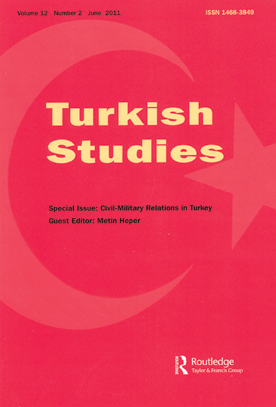
Turkish Studies
Volume 21 Issue 1Right-wing populism and Islamophobism in Europe and their impact on Turkey–EU relations by Ayhan Kaya
Justifying privileged partnership with Turkey: an analysis of debates in the European Parliament by Selin Türkeş-Kılıç
Turkey’s Erdoğan: leadership style and foreign policy audiences by Barış Kesgin
Party regulation in Turkey: a comparison with modern Europe by Pelin Ayan Musil & Jan Vašenda
The hometown cluster-based intergroup threat model: exploring conflict among internal migrant groups in Gebze, Turkey by Tolga Tezcan
Influence and impact: interacting factors in asylum policy-making and implementation in Canada and Turkey (1988–92) by Saime Özçürümez & Christina Hamer

Turkish Studies
Volume 21 Issue 2The European Union’s refugee crisis and rising functionalism in EU-Turkey relations by Beken Saatçioğlu
The role of populist strategies in differing outcomes of corruption scandals in Brazil and Turkey by Nilay Onbaşı
How do Turks abroad vote? by Semra Sevi, Can Serif Mekik, André Blais & Semih Çakır
The AKP’s de-securitization and re-securitization of a minority community: the Alevi opening and closing by Ihsan Yilmaz & James Barry
Differentiated integration: towards a new model of European Union–Turkey relations? by Agnieszka K. Cianciara & Adam Szymański
The recent rapprochement between Iran and Turkey: is it durable or is it a relationship of convenience? by Vahid Yücesoy
The transformation of the political position of the Armenian community in Istanbul vis-à-vis the declaration of the Republic of Turkey by Ari Şekeryan

